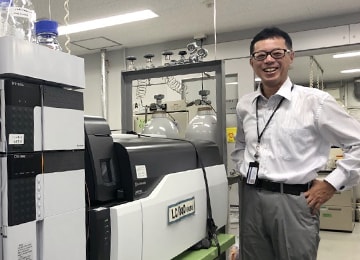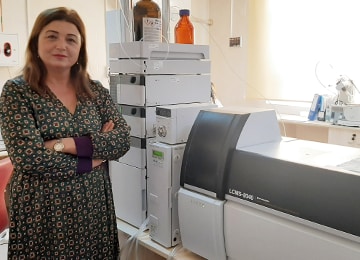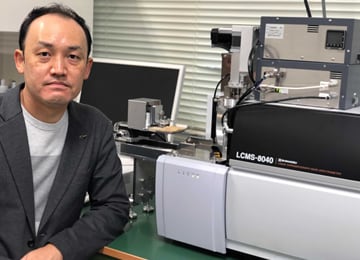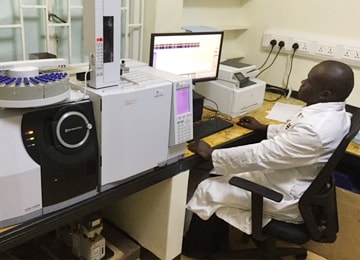Memorable MS Moments (NEW)
Celebrating 50 Years of MS Innovation
Memorable MS Moments
-
First prize : Prof. Eiichiro Fukusaki
Department of Biotechnology, Osaka University -
First prize : Prof. Xu Fengguo
China Pharmaceutical University -
First prize : Dr. Nebile Daglioglu
Cukurova University Faculty of Medicine, Turkey -
Runner-up prize : Prof. Kei Zaitsu
Nagoya University Graduate School of Medicine and the Institute for Advanced Research -
Runner-up prize : Mr. Musa K. Wakabi Directorate of Government Analytical Lab, Uganda
● First prize(1)

Prof. Eiichiro Fukusaki
Department of Biotechnology, Osaka University
Research topics:
Metabolomics, metabolic engineering, metabolic profiling, science of functional foods
Message :
Congratulations to Shimadzu on their 50th MS anniversary. I’m very pleased to have been selected for first prize.
I will continue promoting metabolomics technology around the world with the use of Shimadzu’s GC-MS and LC-MS instruments, and hope for your company’s continued support in these endeavours.
“With this instrument, we can compete internationally”
First experiences with Shimadzu
After graduating university, I worked in the private sector for a while before starting a teaching job at Osaka University, where I have been working since then. Currently I head a metabolomics lab based around GC-MS and LC-MS instruments. When I began at Osaka University, the first instrument we purchased was a Shimadzu GCMS-QP5000. A few years later, we purchased an LCMS-QP8000, and our metabolomics lab started out with these two instruments.
After that, we made great efforts to impact trends in metabolomics research, but back in 2005, metabolomics was only just becoming known in Japan. Research papers on metabolomics being published globally were those using GC-MS instruments from overseas companies. Just as researchers in Japan were wondering how to achieve similar results with domestic GC-MS instruments, I heard about the GCMS-QP2010 Ultra that was soon to be released. When I inquired about the specifications, I felt certain that “with this instrument, we can compete internationally”. Together with many Shimadzu engineers and salespeople, we let other Japanese researchers know about the advantages of the GCMS Ultra. A few years later, Shimadzu took the lead over foreign companies for domestic GCMS sales in the metabolomics field. As of right now, Japan is the only key country in the metabolomics field where Shimadzu holds the number 1 sales spot for GC-MS.
Analysis breakthroughs
In our lab we have achieved multiple breakthroughs in the field of food metabolomics, but among these I would like to highlight two results: “Comprehensive analysis of dipeptides in soy sauce” with the LCMS-8040 and “Comprehensive analysis of D-amino acids in foodstuffs” with the LCMS-8060. We have also received awards domestically and internationally for our studies, but all of that is down to research results achieved with Shimadzu mass spectrometry instruments, for which we would like to express our sincere gratitude.
My future expectations for Shimadzu
Mass spectrometry is an extremely important analysis method in bio-research, but there are still many points for improvement. Of course improvements in sensitivity are always welcome, but we also look forward to an expanded dynamic range. In addition, we very much hope to see a technology which could somehow solve the issue of poor quantitation due to ionization separation. We keenly anticipate new developments in utilizing Shimadzu’s world-class LC technology for MS applications.
● First prize(2)

Prof. Xu Fengguo
China Pharmaceutical University
Research topics:
Pharmaceutical toxicology, metabolomics
Message :
I’m very pleased and honoured to receive a first prize for my “Memorable MS Moments” story. Since 2003, when a centre for collaborative research was established between Shimadzu and the China Pharmaceutical University, I have been growing as a researcher together with new Shimadzu MS technologies, and have received excellent support for my research. I’m looking forward to strengthening our collaborative metabolomics research with Shimadzu in future.
“My journey with Shimadzu equipment (2003~2020)”
First experiences with Shimadzu
After graduating university in 2002, I continued my studies with a master’s degree in analysis of pharmaceuticals at the China Pharmaceutical University’s Analytical Testing Centre. In 2003, the lab’s first liquid chromatograph mass spectrometer was introduced – an LCMS-2020 – and I began my journey of Shimadzu mass spectrometry analysis. Thanks to the high sensitivity and selectivity of this MS, I was able to develop methods for in vivo analysis of Zolmitriptan and Clenbuterol, and to publish my first SCI articles (J. Chromatogr. B Analyt. Technol. Biomed. Life Sci. 2004; J. Pharm Biomed Anal. 2005)
After that, I aimed to solve the twin challenges of weak ODS retention of polar molecules and weak MS response for amphoteric molecules. To this end, I created a method for in vivo analysis of fudosteine based on FMOC-CL derivatization, which was published in J. Mass Spectrom. (2006). In 2008, I received my Ph.D. and moved to the National University of Singapore to conduct research in metabolomics. In 2012, I returned to my alma mater, the China Pharmaceutical University, where I started my own pharmacokinetics research group. Our lab began with two Shimadzu instruments, an LCMS-8040 and a GCMS-QP2010 Plus. Since then we have introduced an LCMS-IT-TOF, an LCMS-8060 and a GCMS-QP2020 NX.
Analysis breakthroughs
In our lab, we concentrate on differences in drug responses between individuals, and we have developed research concepts and methods for early warning drug safety systems, based on ground-breaking developments in metabolomics methods. We have succeeded in establishing world-leading analysis methods and technologies for evaluating pharmaceuticals. Our lab has published 52 articles in various journals such as Analytical Chemistry, and received awards such as the 6th Overseas Chinese Association Meeting Award for Social Contribution - Innovation Team Award.
My future expectations for Shimadzu
Shimadzu is an analytical instrument manufacturer with global recognition, and mass spectrometry is currently the most important platform for metabolomics analysis. With this in mind, I hope that Shimadzu will keep providing the world with new products such as reagent kits, method packages, and instruments for metabolomics analysis and imaging metabolomics, and continue to share their technical knowledge with us.
● First prize(3)

Dr. Nebile Daglioglu
Cukurova University Faculty of Medicine, Turkey
Research topics:
Forensic Toxicology
Message :
Our journey with Shimadzu in the Anti Drug Effort started in 2014. We continue to actively contribute to these studies by using Shimadzu devices in our country. We would like to express our gratitude to the entire Shimadzu family, especially Ant Teknik that is the exclusive distributor of Shimadzu and we wish them to continue their positive support.
“The Anti Drug Effort with Shimadzu in Turkey”
First experiences with Shimadzu
Our forensic toxicology laboratory has expert academicians with approximately 25 years of experience. Analyses of drug abuse and therapeutic drugs, alcohol and pesticides are performed on biological samples in our laboratory for clinical and forensic cases. We have carried out routine analysis using the Shimadzu LCMS-8040 system after the device was purchased for our laboratory in 2015, and have authored many national and international scientific articles in reputable journals in the field of forensic toxicology
Analysis breakthroughs
Since 2018, studies with goverment support have been conducted to determine illicit drug, alcohol and tobacco consumption in wastewater samples. Currently, these analyses are rountinely carried out on samples obtained from wastewater treatment plants in 33 cities in Turkey. We developed and validated LCMS/MS methods for New Psychoactive Substances in wastewater. This study received an award at the 3rd Regional International Association of Forensic Toxicologists Meeting.
My future expectations for Shimadzu
I expect the same commitment to continue supporting their customers, which is especially critical for labs in developing countries that do not have ready funds for new equipment and repairs. We would like to express our gratitude to the entire Shimadzu family, especially Ant Teknik that is the exclusive distributor of Shimadzu and we wish them to continue their positive support and working more closely with us in forensic toxicology areas to improve quality and productivity.
● Runner-up (1)

Prof. Kei Zaitsu
Nagoya University Graduate School of Medicine and the Institute for Advanced Research
Research topics:
Analytical biochemistry, bioinformatics, forensics
Message :
I’m very pleased to receive a runner-up prize for my story on the significant milestone of Shimadzu’s 50th MS anniversary. I hope Shimadzu will continue to expand its scope and develop more ground-breaking instruments.
“Opening up future possibilities with Shimadzu instruments”
The first Shimadzu MS I encountered was the GCMS-QP5050. I remember I had just joined the forensics lab and was looking at numbers I didn’t yet understand on the monitor after inserting a sample into the GCMS-QP5050. My boss looked over my shoulder, and I’ll never forget my surprise when she immediately remarked, “Caffeine, huh.” It seemed like magic to me.
Just one month later, a new “magical instrument”, the GCMS-QP2010, arrived at the forensics lab. I heard even the bosses at the lab saying that it was astonishingly sensitive, and I felt great excitement at the potential of this technology. The GCMS-QP2010 became a reliable partner in solving drug cases.
Of course, in order to get the best results from these “partners”, regular maintenance was indispensable. I remember staying up late with my labmates carrying out maintenance, readying the instruments for the next drug case. For the ten years that I was working in that forensics lab, the GCMS-QP2010 was a true partner to me, and even now when I see one, I get nostalgic for those times.
Later, I transferred to Nagoya University, carrying out research with mass spectrometry. I undertook my first metabolome analyses with a GCMS-QP2010 Ultra, and was truly impressed with its high scanning speed. I used the GCMS-TQ8040 as a metabolomics platform, and thanks to its high sensitivity and selectivity, I contributed to several journal articles. At present, I’m using the DPiMS-8060, a next-generation platform which even removes the need for manual pretreatment. This has greatly expanded my research and led to results which graced the cover page of Analytical Chemistry. I wonder what “magical” instrument will be devised next? I have faith that Shimadzu Corporation will continue to create new magic in the field of MS and open up future possibilities, not only for us researchers but for Japan as a whole.
My future expectations for Shimadzu
Given the pace of global change, Japan may be entering a crucial stage of international competition. However, as a world leader in science and engineering, I feel we are supported by very elaborate and high-level technology. I believe that Shimadzu’s MS technology plays an important role in that support. I hope that we researchers can collaborate further with Shimadzu to pioneer new technological developments in future.
● Runner-up (2)

Mr. Musa K. Wakabi
Directorate of Government Analytical Lab, Uganda
Research topics:
Criminalistics, toxicology
Message :
I am indebted to Shimadzu for selecting me amongst the users of Shimadzu GC-MS equipment across the globe as a runner up for this campaign.
The use of Shimadzu triple quadrupole gas chromatography-tandem mass spectrometry with its information-rich content and explicit confirmation has enabled us to obtain excellent results in food safety, environment monitoring and forensic toxicology.
I am privileged for this and looking forward to continue my journey of mass spectrometry with Shimadzu as before with more enthusiasm and ambition.
“Shimadzu GC-MS analytical results that have contributed to society”
Analysis with Shimadzu instruments
The increasing public concern about pesticide contamination of food and the environment in recent years has increased the demand for broader and stricter pesticide monitoring. This requires an effective analytical technique for the simultaneous determination of pesticide residues to protect consumers and guarantee the safety of agricultural products.
This study was aimed at determination of pesticide residues in cucumber using a GC-MS/MS with QuEChERS method in sample preparation. The use of Shimadzu triple quadrupole gas chromatography-tandem mass spectrometry (GCMS-TQ8040) with its information-rich library enabled excellent results to be obtained, thanks to its wonderful sensitivity and selectivity with helium carrier gas at a constant flow of 1mL/min. Pesticides were identified according to their retention times and target and qualifier ions, based on the peak area ratio of the targets to that of internal standard.
Contribution to society
Working in a forensic laboratory has enabled me to use Shimadzu GC-MS/MS equipment for a period of 10 years, carrying out toxicological analyses for toxic chemicals to provide answers to legal matters in courts of law. I have been able to analyse exhibits of suspected chemical poisoning and related cases submitted by police investigating officers, and have presented scientific evidence as an expert witness, thereby playing a central role in the administration of justice in Uganda.
My future expectations for Shimadzu
I have the confidence and trust that Shimadzu will continue supplying the world of analytical science with highly efficient and robust instruments able to perform unprecedented analyses of ultra-trace amounts, with higher mass resolution, coupled with reduced maintenance frequency, reduced long-term operational costs and greater uptime.


